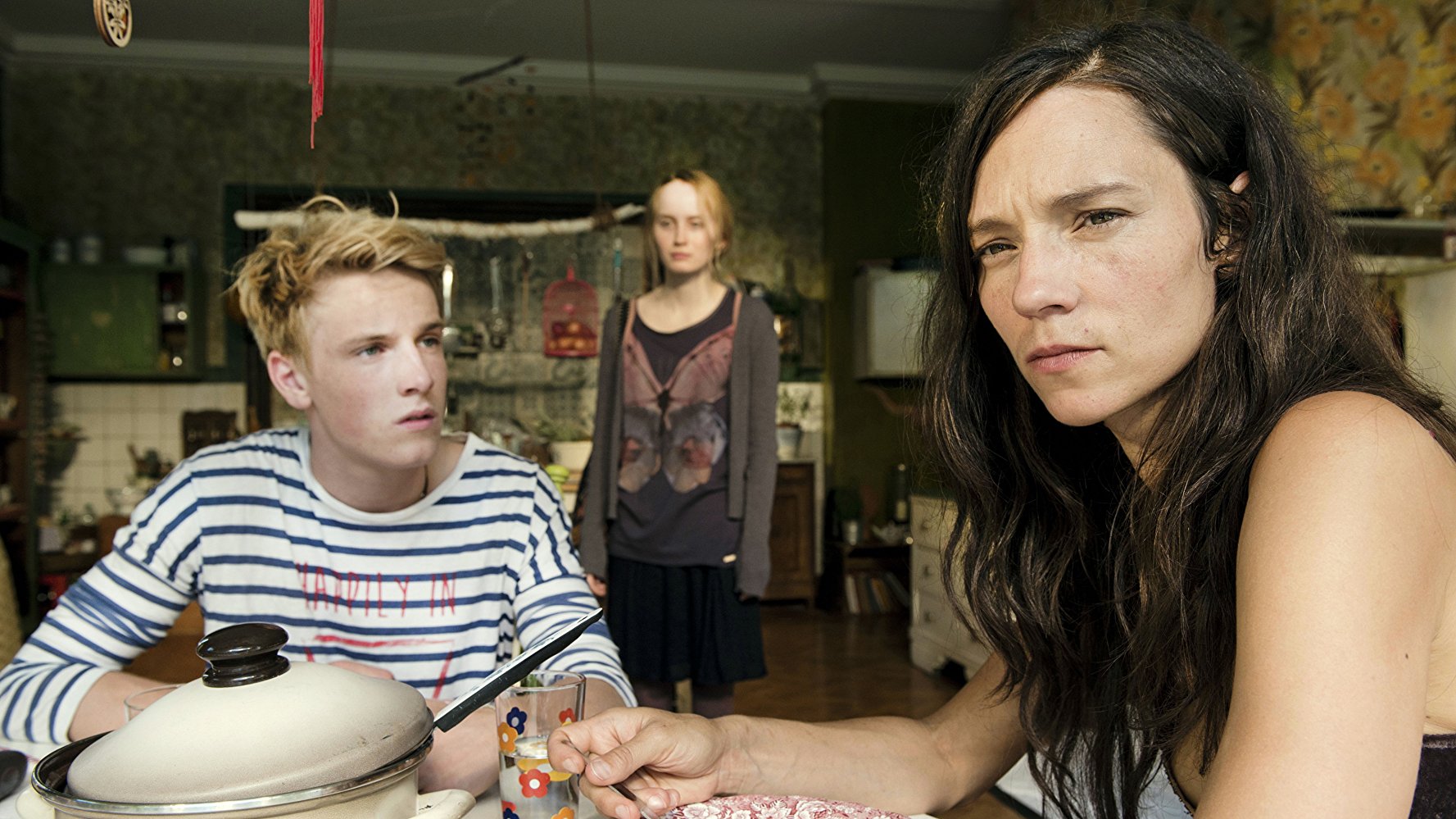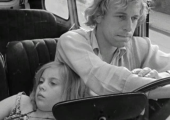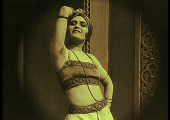Director Jakob M Erwa's Centre of My World may be a coming-of-age story, but it’s definitely not a “coming out” one. Youthful hero Phil (Louis Hofmann) has barely reached the third sentence of his voiceover narration before he tells us he’s gay, and absolutely fine about it. There may be plenty of other emotional dysfunction in Phil’s world, but concerns about his own sexuality don’t feature.
It’s an encouraging perspective to start from, particularly when we remember that Erwa’s film is an adaptation of an acclaimed Young Adult novel by Andreas Steinhofel The Centre of the World (Die Mitte der Welt) that was published, and won prizes back at the end of the 1990s, when such assuredness about youthful gay identity might well have been considered the exception rather than the rule. There aren’t many external clues as to exactly when the director has set his film, though New Year fireworks with mention of the new millennium suggest we’re at about the same time that the source novel was published; our sense of the relative innocence of Phil’s world – or at least his place in it – is certainly accentuated by the absence of any of the later paraphernalia of adolescence such as phones or social media.  Opening with Phil returning home from summer camp in France to discover that a storm has rather devastated the landscape of his small-town home, we sense that it isn’t only the trees that have been uprooted. His twin sister Dianne (Ada Philine Stappenbeck) has gone inexplicably distant, and something has clearly damaged her relationship with their free-spirit mother, Glass. That unusual name isn’t the only thing that makes Swiss actress Sabine Timoteo stand out, and rather fragile to boot: she has never let on to them who their father was, and appears catastrophically unable to keep a man in her life. She even has a ledger listing her past male involvements that has fascinated her children, particularly in their earlier life, of which we see quite a lot in rather overdone flashbacks to an almost parodically blond youth. They all live happily in a rambling country home that’s known, for reasons that aren't divulged, as “Visible”, which is certainly not what could be said about understanding what the family actually lives on, no hint of any daily grind apparent on their balmy horizons. (Pictured above: Louis Hofmann, Ada Philine Stappenbeck, Sabine Timoteo)
Opening with Phil returning home from summer camp in France to discover that a storm has rather devastated the landscape of his small-town home, we sense that it isn’t only the trees that have been uprooted. His twin sister Dianne (Ada Philine Stappenbeck) has gone inexplicably distant, and something has clearly damaged her relationship with their free-spirit mother, Glass. That unusual name isn’t the only thing that makes Swiss actress Sabine Timoteo stand out, and rather fragile to boot: she has never let on to them who their father was, and appears catastrophically unable to keep a man in her life. She even has a ledger listing her past male involvements that has fascinated her children, particularly in their earlier life, of which we see quite a lot in rather overdone flashbacks to an almost parodically blond youth. They all live happily in a rambling country home that’s known, for reasons that aren't divulged, as “Visible”, which is certainly not what could be said about understanding what the family actually lives on, no hint of any daily grind apparent on their balmy horizons. (Pictured above: Louis Hofmann, Ada Philine Stappenbeck, Sabine Timoteo)
Despite such hurdles, Phil has grown into an attractively balanced – and just plain attractive, the youthful beauty quotient of the film, aimed at least partly at the teen market, being considerable – adolescent. His ease about his sexuality – it’s revealing how writing those words brings home how much, and for how long we have assumed, narrative-wise, that growing up gay is bound not to be easy – has been clearly been nurtured as well by the presence of a nicely grounded lesbian couple close to the family, who reliably step in when Glass is having one of her brittle moments.
Yet 'Centre of My World' finally deserves rather more than sarcasm
If that wasn’t supportive enough, his boon companion Kat (Svenja Jung) is clearly delighted she has a GBF with whom she can share bicycle rides (the innocence!) and school gossip. Of which last the newest instalment concerns the appearance of new kid-in-class Nicholas (Jannik Schumann), whose beauty is such, even by this film’s standards, that Erwa introduces him in swooning slow motion. (It is a device, it has to be said, of which the director is inordinately fond, just as his predilection for kaleidoscope-like image-collages is pronounced, too). Cue, we might assume, winsome longing on Phil’s part for this handsome, mysterious stranger…
Not a bit of it. The athletic Nicholas has barely done a couple of laps of the sports track before the two are making out in the shower (they aren’t strangers, in fact, having experienced a shared youth memory which gets rammed home by Erwa’s resorting to that old chestnut, “significant childhood object”). Support from the lesbians comes not only in listening to Phil’s “Is he the one?” musings, but in lending their summer cottage for assignations that look as idyllic in a tasteful soft porn sort of way as the flowers that blossom around the place.
For Phil, however, first love is a bloom bound to come with thorns. A whole range of denouements are due that variously tie up (or not) issues both in the immediate present and left hanging from that odd childhood past. Some of them inevitably bring pain, which we believe rather completely when it comes to Phil and his romantic upset, rather less so with some of the plot gimmicks lobbed at various other players. Yet Centre of My World finally deserves rather more than sarcasm. It may over-employ visual and other forms of gimmickry, and has a saccharine quality that is surely not knowing, but the film’s heart is in the right place. Its final scene, as Phil moves away from the world in which his life began, asserts just how much he has truly come of age – and that his journey has been a real one.
Overleaf: watch the trailer for Centre of My World








 Opening with Phil returning home from summer camp in France to discover that a storm has rather devastated the landscape of his small-town home, we sense that it isn’t only the trees that have been uprooted. His twin sister Dianne (Ada Philine Stappenbeck) has gone inexplicably distant, and something has clearly damaged her relationship with their free-spirit mother, Glass. That unusual name isn’t the only thing that makes Swiss actress Sabine Timoteo stand out, and rather fragile to boot: she has never let on to them who their father was, and appears catastrophically unable to keep a man in her life. She even has a ledger listing her past male involvements that has fascinated her children, particularly in their earlier life, of which we see quite a lot in rather overdone flashbacks to an almost parodically blond youth. They all live happily in a rambling country home that’s known, for reasons that aren't divulged, as “Visible”, which is certainly not what could be said about understanding what the family actually lives on, no hint of any daily grind apparent on their balmy horizons. (Pictured above: Louis Hofmann, Ada Philine Stappenbeck, Sabine Timoteo)
Opening with Phil returning home from summer camp in France to discover that a storm has rather devastated the landscape of his small-town home, we sense that it isn’t only the trees that have been uprooted. His twin sister Dianne (Ada Philine Stappenbeck) has gone inexplicably distant, and something has clearly damaged her relationship with their free-spirit mother, Glass. That unusual name isn’t the only thing that makes Swiss actress Sabine Timoteo stand out, and rather fragile to boot: she has never let on to them who their father was, and appears catastrophically unable to keep a man in her life. She even has a ledger listing her past male involvements that has fascinated her children, particularly in their earlier life, of which we see quite a lot in rather overdone flashbacks to an almost parodically blond youth. They all live happily in a rambling country home that’s known, for reasons that aren't divulged, as “Visible”, which is certainly not what could be said about understanding what the family actually lives on, no hint of any daily grind apparent on their balmy horizons. (Pictured above: Louis Hofmann, Ada Philine Stappenbeck, Sabine Timoteo)
